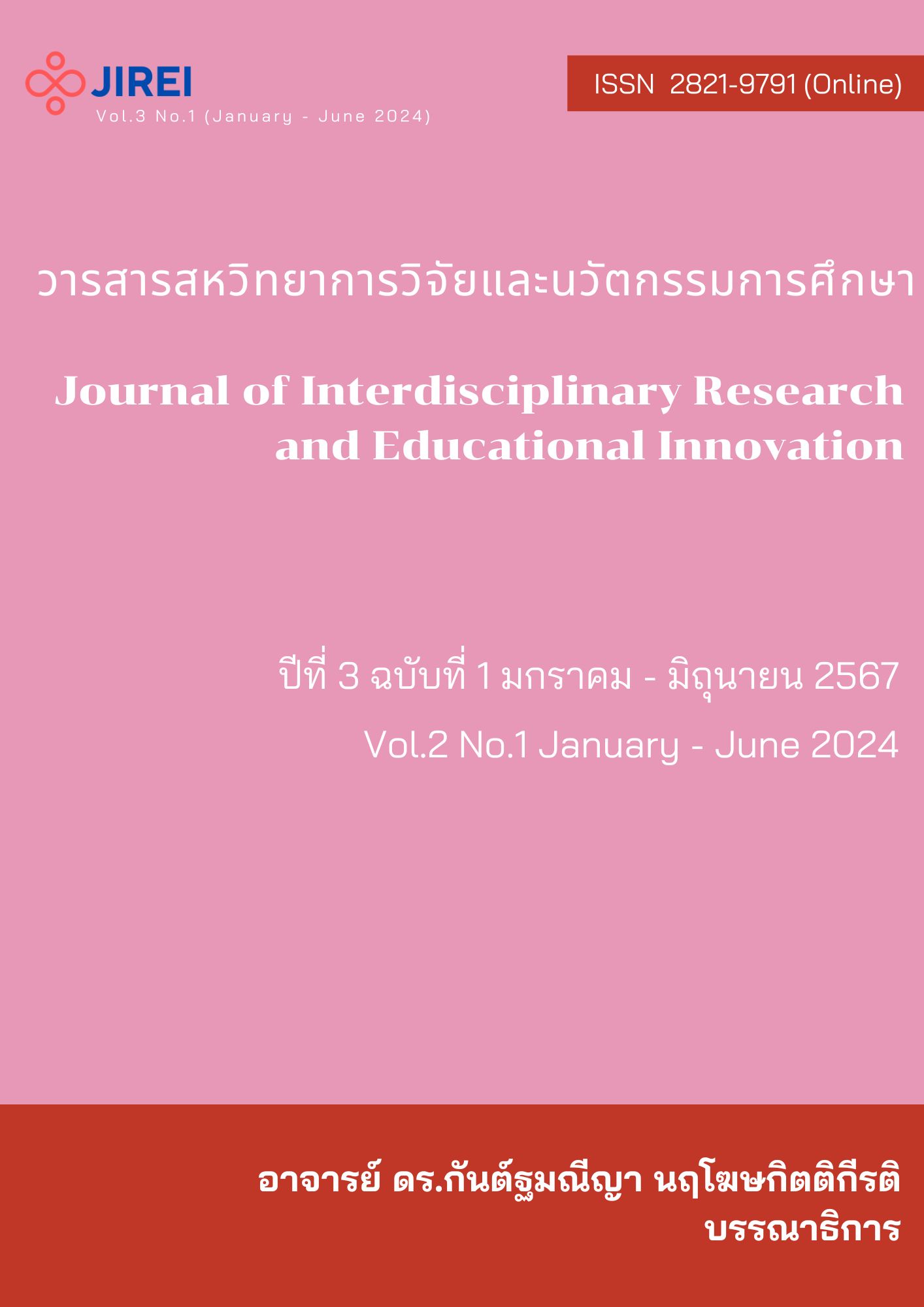คุณลักษณะภาวะผู้นำการเปลี่ยนแปลงทศวรรษที่ 21 ของผู้บริหารโรงเรียน สังกัดสำนักงานเขตพื้นที่การศึกษาประถมศึกษา
คำสำคัญ:
ผู้นำ, ภาวะผู้นำแห่งการเปลี่ยนแปลง, ผู้นำ; ภาวะผู้นำแห่งการเปลี่ยนแปลง; คุณลักษณะของผู้นำการเปลี่ยนแปลง; ภาวะผู้นำดิจิตอล; ภาวะผู้นำยอดเยี่ยม, ภาวะผู้นำดิจิตอล, โลกในทศวรรษที่ 21บทคัดย่อ
สังคมโลกในปัจจุบันมีการเปลี่ยนแปลงอย่างรวดเร็ว ประเทศต่างๆ ทั่วโลกมีการติดต่อสื่อสารและแลกเปลี่ยนข้อมูลข่าวสารกันอย่างสะดวกสบาย ทำให้เกิดการแข่งขันกันในทุกด้าน ไม่ว่าจะเป็นการเมือง เศรษฐกิจ ธุรกิจ สังคม เทคโนโลยี และการศึกษา ประเทศไทยในฐานะสมาชิกของโลกก็ได้รับผลกระทบจากการเปลี่ยนแปลงนี้ และจำเป็นต้องปรับปรุงและพัฒนาตัวเองในทุกด้านเพื่อให้สามารถดำรงอยู่ท่ามกลางความแปรผันของโลกยุคนี้ได้ ความสามารถในการแข่งขันและสร้างความมั่นคงทางเศรษฐกิจถือเป็นกุญแจสำคัญที่จะนำไปสู่ความมั่นคงของประเทศ และเป็นเป้าหมายของการพัฒนาที่ยั่งยืน ซึ่งจำเป็นต้องอาศัยทั้งกำลังคน เทคโนโลยี และมโนธรรมของสังคม เครื่องมือที่ดีที่สุดอันจะช่วยให้การพัฒนาบรรลุจุดมุ่งหมาย คือการศึกษา เพราะการศึกษาเป็นกิจกรรมที่มุ่งพัฒนาทั้งด้านสติปัญญา ความสามารถในการปฏิบัติงาน อย่างไรก็ตาม คุณภาพของการศึกษาที่ผ่านมายังไม่ประสบความสำเร็จเท่าที่ควร และผลการจัดอันดับคุณภาพการจัดการศึกษาของประเทศไทยยังไม่เป็นที่น่าพอใจ ในกระแสโลกยุคโลกาภิวัตน์ที่ความเจริญทางเทคโนโลยีและก่อให้เกิดความเปลี่ยนแปลงของสังคมอย่างรวดเร็ว ผู้นำ (Leader) และ "ภาวะผู้นำ (Leadership)" จึงเป็นปัจจัยคู่สำคัญที่ควรมีการพัฒนาบนพื้นฐานของ ทางสายกลาง และ การรักษาสมดุล ขององค์ประกอบต่างๆ และ การจัดลำดับความสำคัญ (Priority) ซึ่งเป็นสิ่งที่สำคัญมาก สำหรับการดำเนินชีวิต ทั้งในระดับปัจเจกบุคคล และในระดับผู้นำ ดังนั้น ภาวะผู้นำการเปลี่ยนแปลง จึงเป็นภาวะผู้นำแนวใหม่ที่ได้ถูกสังเคราะห์ขึ้นจาก ทฤษฎีภาวะผู้นำพื้นฐาน 5 รูปแบบ เพื่อให้มีคุณลักษณะอันสอดคล้องกับยุคดิจิตอล และโลกในทศวรรษที่ 21
เอกสารอ้างอิง
Gunter, H.M. (2001). Leaders and leadership in education. London : Paul Chapman Publishing.
Leithwood, K. et al ., (1999). Changing leadership for changing times. Philadephia : Open University Press.
Pary, K. (1996). Transformational leadership. Melbourn, Australia : Pitman Publishing.
สุเทพ พงศ์ศรีวัฒน์. (2545). ภาวะผู้นำ : ทฤษฎีและปฏิบัติ. กรุงเทพฯ : บุคส์ลิงค์
สุภัชชา พันเลิศพาณิชย์. (2558). บทความทางวิชาการ เรื่อง การพัฒนาภาวะผู้นําตามแนวทางปรัชญา
เศรษฐกิจพอเพียง, ข้อมูลออนไลน์ https://www.gotoknow.org/posts/57315
สมบัติ กุสุมาวลี. (2559). ผู้ช่วยศาสตราจารย์ คณะพัฒนาทรัพยากรมนุษย์ สถาบันบัณฑิตพัฒนบริหารศาสตร์,
การสํารวจแนวคิดภาวะผู้นําในองค์กรระดับโลก ศึกษาจาก Harvard Business Review 2010-2012, การประชุมวิชาการระดับชาติในวันคล้ายวันสถาปนาสถาบันบัณฑิตพัฒนบริหารศาสตร์ ประจําปี
ศิริยุพา รุ่งเรืองสุข. (2561). กรรมการบริหารและหัวหน้าหลักสูตรการบริหารงานบุคคล สถาบันบัณฑิต
บริหารธุรกิจ ศศินทร์แห่งจุฬาลงกรณ์มหาวิทยาลัย, Smart Leadership: กลยุทธ์การนำระดับกูรู,
นภวรรณ คณานุรักษ์. (2560). ผู้ช่วยศาสตราจารย์สาขาวิชาการตลาด คณะบริหารธุรกิจ มหาวิทยาลัยหอการค้า, ภาวะ ผู้นำเพื่อองค์กรที่มีประสิทธิภาพ (Leadership for Efficiency Organization)
ปรเมธี วิมลศิริ. (2559). ยุทธศาสตร์ชาติ 20 ปี อนาคตประเทศไทย เพื่อความมั่นคง มั่งคั่ง ยั่งยืน. เอกสารประกอบการบรรยาย วันศุกร์ที่ 26 สิงหาคม 2559.
นายกรัฐมนตรี.(2559). แผนพัฒนาการศึกษาของสำนักงานปลัดกระทรวงศึกษาธิการ. กรุงเทพฯ: กระทรวงศึกษาธิการ.
เพียรชันธ์ กิจพาณิชย์เจริญ. (2552). ศึกษาสมรรถนะการบริหารวิชาการของผู้บริหารโรงเรียนสังกัดสำนักงานเขตพื้นที่การศึกษาประถมศึกษา สำนักงานเขตหนองแขม กรุงเทพมหานคร. สารนิพนธ์ กศ.ม. (การบริหารการศึกษา). กรุงเทพฯ: บัณฑิตวิทยานัย มหาวิทยานัยศรีนครินทรวิโรฒ
ไพฑูรย์ สินลารัตน์. (2557). เพื่อความเป็นเลิศของการครุศึกษาไทย.กรุงเทพฯ: ม.ธุรกิจบัณฑิตย์.
ไมตรี คงนุกูล. (2551) การศึกษาภาวะผู้นำแห่งการเปลี่ยนแปลงของผู้บริหารโรงเรียนนานาชาติ กรุงเทพ. สารนิพนธ์ กศ.ม. (การบริหารการศึกษา). กรุงเทพฯ: ชัณฑิตวิทยานัย มหาวิทยาลัยศรีนครินทรวิโรฒ.
วรพจน์ วงศ์กิจรุ่งเรือง และ อธิป จิตตฤกษ์. (2556). ทักษะแห่งอนาคตใหม่: การศึกษาเพื่อศตวรรษที่ 21. พิมพ์ครั้งที่ 2. กรุงเทพฯ โอเพ่นเวิลด์ส พับลิซซิ่ง เฮาส์ จำกัด.
วิโรจน์ สารรัตนะ. (2556). การวิจัยทางการบริหารการศึกษา. พิมพ์ครั้งที่ 3. กรุงเทพฯ: ทิพยวิสุทธิ์
วิโจน์ สารรัตนะ. (2560). ภาวะผู้นำ : ทฤษฎีและนานาทัศนะร่วมสมัยปัจจุบัน – กรุงเทพฯ ทิพยวิสุทธิ์
ศุภลักษณ์ เสรีรัตน์ และคณะ. (2550). การพัฒนาระบบบริหารที่มุ่งเน้นความเป็นเลิศของสถานศึกษาเอกชน วิทยานิพนธ์ปริญญาดุษฎีบัณฑิต สาขาวิชาบริหารการศึกษาคณะครุศาสตร์ จุฬาลงกรณ์มหาวิทยาลัย
สังคม จันทร์วิเศษ. (2555). การพัฒนาตัวแบบปัจจัยที่มีอิทธิพลต่อภาวะผู้นำทางวิชาการของผู้บริหารสถานศึกษาขั้นพื้นฐาน. วิทยานิพนธ์ปริญญาปรัชญาดุษฎีบัณฑิต สาขาวิชาความเป็นผู้นำและการบริหารการศึกษา มหาวิทยาลัยราชภัฏสุรินทร์
สมชาย เทพแสง. (2554). ผู้นำยุคใหม่หัวใจของการปฏิรูป. พิมพ์ครั้งที่ 2 กรุงเทพฯ : เกรท เอ็ดดูเคชั่น
สมเกียรติ พละจิตต์. (2555). ภาวะผู้นำทางวิชาการในโรงเรียนดีเด่น. วิทยานิพนธ์ปริญญาดุษฎีบัณฑิต สาขาวิชาภาวะผู้นำทางการบริหารการศึกษา มหาวิทยาลัยราชภัฏสกลนคร
สันทัด ศะศิวณิช (2552) การทำงานเป็นทีม. สืบค้นเมื่อ 8 สิงหาคม 2554 จากhttp://www.dopa.go.th/iad/subject/teamwork.doc/
สิร์รานี วะสุภัทร. (2551) ภาวะผู้นำทางวิชาการและสมรรถนะของผู้บริหารโรงเรียนสังกัดสำนักงานเขตพื้นที่การศึกษาประถมศึกษาที่ส่งผลต่อความสำเร็จของการบริหารโดยใช้โรงเรียนเป็นฐาน. วิทยานิพนธ์ปริญญาครุศาสตรดุษฎีบัณฑิต สาขาวิชาการบริหารการศึกษา มหาวิทยาลัยเกษตรศาสตร์
สำนักงานคณะกรรมการพัฒนาเศรษฐกิจและสังคมแห่งชาติ (2555) ร่างแผนพัฒนาเศรษฐกิจและสังคมแห่งชาติฉบับที่สิบเอ็ด พ.ศ. 2560-2564 กรุงเทพฯ
สำนักงานเลขาธิการสภาการศึกษา (2557) รายงานวิจัยแนวทางการพัฒนาการศึกษาไทยกับการเตรียมความพร้อมสู่ศตวรรษที่ 21 กรุงเทพฯ : กระทรวงศึกษาธิการ (2559) แผนการศึกษาแห่งชาติ พ.ศ. 2560-2579 กรุงเทพฯ : กระทรวงศึกษาธิการ
อาคม สีพิมพ์สอ (2550) ความสัมพันธ์ระหว่างภาวะผู้นำของผู้บริหารกับประสิทธิผลโรงเรียนประถมศึกษา





